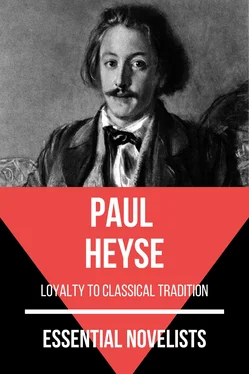And yet, when he came again, it almost always happened that the conversation went back to the same point at which it had been broken off the last time. Then they exchanged parts, and it was his turn to give utterance to his thoughts and rhapsodize undisturbed over the most important questions. It was the strangest dialogue in monologues that can be imagined, since twice four and twenty hours usually elapsed between question and answer.
Was the cause of this, his fear of making the contrast between their natures too perceptible, the dread that any dispute must instantly part them forever, while he still considered it almost a duty, when the matter had once more become indifferent to her, not to withhold his opposition or deny his opinion. Or did he suspect that he should lose all mastery over himself, if he obtained more and more control over her and gradually harmonized and assimulated the heterogenious traits in her character? And what was the use of this daring venture? What was to be hoped for, even in the best case? To tame a gazelle, an antelope—what can it avail in a zone and on a soil that are not created for tropical animals—
It was on a gloomy afternoon in September, the first autumn rain was falling, and the wind sweeping chilly through the empty street, the windows were closed and a little fire was burning on the hearth, though rather for the pleasure afforded by the sight of the bright flames, than through any necessity for warmth. The beautiful girl, who had often boasted that she had never been really sick, complained of a slight headache, sent away the carriage which was to convey her to the theatre, and threw herself on the sofa in the little red dining room, with her feet toward the flames, whose red flickering light lent some color to her pale cheeks.
"Read something aloud to me, Doctor," she said. "If I fall asleep over it, so much the better. But don't choose Hermann and Dorothea; I don't wish to offend you, as we have already quarrelled over it once, and yet I can't help being lulled to sleep by the wonderful verses, as if I were in a cradle, gladly as I would keep awake to listen to the beautiful story. Do you know that I consider this Dorothea a very enviable person, nay I have really never found the fate of any heroine in a novel happier than hers? Poor, orphaned, homeless—she suddenly comes into possession of a farm, and is loved and petted, and it all comes about as naturally as if such a thing might happen any day! She must have been very charming," she added after a pause, "I always imagine her tall and slender, with raven hair and grey eyes, a black ribbon round her fair neck, and ear rings with a red stone, which is really only a bit of glass—"
"By the way," he interrupted, "I have long wanted to ask you something: why do you wear no earrings or jewelry of any kind?"
"Because I am too poor to get large diamonds or real pearls, and I do not care for any other ornaments."
"Too poor?"
"Yes indeed, much too poor, far poorer than you perhaps suppose, at any rate poorer than Dorothea, who possessed the greatest treasure, contentment. I, on the contrary—do you suppose I should have considered it a happiness to become Frau Hermann?"
"If you had really been in love with him—"
She looked at him quietly, as if trying to discover whether he was in earnest, and then said:
"You're a singular person. Wisdom does not seem to be any protection against folly, and you take no notice of the existence of anything that does not accord with your system. How often must I explain to you, that I have no idea of what you call being in love. And see, even in your Dorothea, though created by a poet—and falling in love plays so prominent a part in all poetry—yet I can discover no trace of this singular condition. She meets a young man, who leads her from the street into his house and wishes to make her his wife. As he seems kind and good, and promises to become one of those persons who are represented as pattern husbands—why should she say no, especially as the pastor and doctor and provincial customs are not at all repulsive to her? And that's just why I envy her. I, on the contrary—but please throw a few sticks of wood on the fire; it's going out."
He did as she requested, and was kneeling before the hearth kindling the flames anew with a dainty pair of bellows, when a noise and altercation arose in the entry, which attracted his attention. The whinning voice of little Jean, eagerly arguing with a deep bass, was distinctly audible, then the door of the ante-room was thrown open, and the disputants approached the little drawing room; the stranger, with a rude laugh, pushed aside the boy, who endeavored to prevent his entrance, there was a knock at the door, and without even waiting for a reply, a tall fellow in a rich huntsman's livery, boldly entered, as if entirely at home.
The young lady had hastily started up and was gazing at the intruder in speechless alarm. Edwin had also risen from his knees, with the bellows still in his hand, and was just in the act of accosting the man, when the latter, with an elegant bow to Toinette, drew a letter from his pocket and laid it on the little table before the sofa.
"Beg pardon, Fräulein, if I have disturbed you," he said casting an insolent glance at Edwin, "but the Herr Count expressly commanded me to deliver this note into your own hands."
"Did not my servant tell you—?" Toinette interrupted.
"That his young lady was not at home, yes; and also that she wished to receive no notes, and preferred not to know the Herr Count, as she had already intimated by not answering the letters His Excellency sent through the post office—"
"Leave this room at once," fell with great difficulty from the lips of the pallid girl, "and if you venture to come again and force an entrance in this way—I shall find some means to protect my rights in this house."
"Pardon me, Fräulein," said the impudent fellow, with a saucy grin, "but no one has any rights in a house except the person to whom it belongs. If it is agreeable to my lord the count, to have his servant turned out of a house, or the doors shut in his face, when His Excellency is, so to speak, the tenant—"
"Insolent rascal!" Edwin burst forth. "Did you not hear what the young lady told you? I've not the honor of your master's acquaintance. But if he's a gentleman, it cannot be his intention to have a lady insulted by a boorish lackey!"
The man, with cool impertinence, measured the person who so unexpectedly addressed him from head to foot.
"And I, sir, have not the honor of your acquaintance," he retorted. "But as for my conduct, no one but the Herr Count has a right to call me a boor. There is the letter, and now I can go, as I have done my errand. I had no idea of insulting the young lady, that would have been entirely against my orders. But to have the first stranger—"
Edwin involuntarily raised the little weapon he held in his hand, but the next instant recollected himself. The bellows fell on the floor, he passed close by the man, opened the drawing room door, and fixing a firm glance on the suddenly intimidated lackey, exclaimed: "Be off!"
The man lingered an instant longer, then with another bow to Toinette, slowly retreated.
"I will inform His Excellency," he said on the threshold, "that the young lady had no time to answer the Herr Count's letters, because she had gentlemen visitors."
Edwin closed the door behind him. They heard the fellow laugh loudly and joke with Jean as he went away, as if nothing had happened.
A death-like silence pervaded the little drawing room. The beautiful girl sat motionless on the sofa, with her eyes fixed upon the fatal letter, which still lay unopened on the table, and her pale hands folded in her lap. Edwin stood at the door, his hand still raised in the threatening gesture with which he had motioned the insolent fellow to leave the room. Not until he heard the outer door close, did he suddenly move, as if he had shaken off an incubus, and quietly approached the silent Toinette.
Читать дальше












